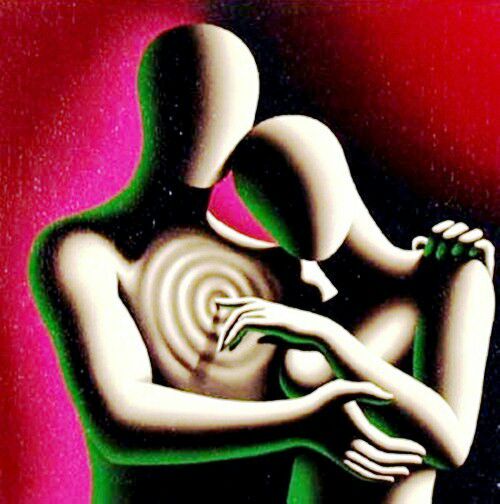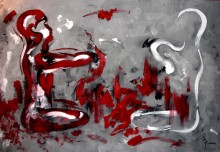The Art of Loving
Years ago when I was studying psychology at university, I read Erich Fromm’s The Art of Loving. It was revolutionary at the time in its frank, hold-no-bars discussion about what Love really is and what it is not. This was before co-dependency was even a word and long before psychologically-savvy neo-tantra teachers were household names. I recently read this classic again and I’m inspired to share some of Fromm’s timeless concepts:
In any art, one must have three things:
1. Mastery of the theory
2. Mastery of the practice
3. Devotion to the art at all cost
This applies to a martial art, playing an instrument, planting a garden, operating on a human heart and also loving another human being. Eventually both the mastery of the theory and of the practice will merge into one and it will become an intuitive, in-built part of oneself, emanating as true mastery.
The Theory of Loving:
*We are aware of our aloneness and separation in this world. We seek to overcome this alienation and find satisfying union. Only Mature Love will bridge this.
*As long as core mother and father relationships are unhealed in our psyche, we will seek symbiotic relationships that are attempts to prolong the mother bond or create one that never existed by giving up oneself or imposing oneself onto another. This is fusion without integrity, which is now termed, co-dependency. It is ‘giving up me to be loved by you.’
*Mature Love is fusion with integrity. It is union where one’s individuality is preserved. Two beings become one and yet remain two.
*A mature, loving couple Stand in Love, rather than Fall in Love.
*Sex and the sexual orgasm can “become the desperate attempt to escape the anxiety engendered by separateness, and it results in an ever increasing sense of separateness, since the sexual act without love never bridges the gap between two human beings, except momentarily.”
*True love gives. And when it does, it awakens and produces love in the other. This is the test of real love.
Certain basic elements common to all forms of love are:
*Care: is the active concern for the life and the growth of our partner. It’s making my love a green juice each morning.
*Responsibility: it’s an entirely voluntary act, not a duty. It is my response to the needs, expressed or unexpressed, of another human being. To be responsible means to be able and ready to respond. It is picking up the kids from school for a week, because my spouse needs a break.
*Respect: is the ability to see a person as he or she is, to be aware of their unique individuality. Respect means the concern that the other person should grow and unfold as they are. It is the absence of exploitation. I want my lover to grow and unfold for their own sake, in their own ways, and not for the purpose of serving me. I feel at one with them, as they are and not as I need him to be as an object for my use. Respect is possible only if I have achieved independence. Respect exists only on the basis of freedom, never that of control or domination. For instance, I respect my partner’s wish to go back to study, even though this will mean less weekend getaways and my juggling more of our joint business. But I happily choose to do this because I love my partner.
*Knowledge: is an aspect of love and does not stay at the periphery, but penetrates to the core. It is possible only when I can transcend the concern for myself and see the other person on his or her own terms. It’s jumping the other’s fence. It is seeing and knowing the vulnerable hurt, insecurities and suffering that motivate any surface behaviour. So, while you were ignoring my advances these last nights, I remembered that you had your work review a few days ago. I wonder if there was feedback in it that has been troubling you.
*Awareness of male and female psyche: the basic need to fuse with another person so as to transcend the prison of one’s separateness is closely related to wanting to penetrate into the secret of a person’s soul, into the innermost nucleus of who he or she is. We can do it out of sadism, where we force his secret through torture and abuse or we can know his or her secret through loving, active penetration. In the act of fusion, I know you, I know myself, I know everybody – and I know nothing.
*Psychological knowledge: this is a necessary for the act of love to last. I must be vigilant of my projections and when I am being projected upon. Only if I know a human being objectively, can I truly know her or his authentic self and ultimately this is truly love.
The Practice of Loving:
*Discipline is needed in one’s whole life, not just in loving. Without such discipline, however, life becomes shallow, chaotic and lacking concentration. Discipline should not be practised like a rule imposed on oneself from the outside, but rather it becomes an expression of one’s own will; and it should feel pleasant, so that you become accustomed to this kind of behaviour – if you stopped practising it, you would miss it.
*Concentration is a necessary condition for the mastery of an art. It is being mindful and present for not only the one we love but in all of life. A workshop leader once pointed out to a male participant that he would likely never attract a woman if he continued to hang his mouth open like he did. Mindfulness of love requires attention, it’s being awake in each moment.
*Paradoxically the ability to be alone or concentrate on being, is a necessary condition for the ability to give and receive real love. If I am attached to another person because I cannot stand on my own feet, he or she may be a lifesaver, but the relationship is not one born out of real love.
*Avoid trivial conversation; avoid gossip instead of talk, avoid cliché opinions instead of thinking. If one reacts directly and humanly instead, often people are invited to deepen their relating.
*Listen actively.
*Live fully in the present, in the here and now, and avoid thinking of the next thing to be done.
*Be emotionally intimate with each other without running away through the many distractions or diversion tactics that exist.
*Develop a sense of sensitivity and awareness of oneself.
*Patience: the ability to trust and accompany peacefully.
*Giving supreme importance to learning the art of loving is a requirement. It is the dedication and devotion of one’s entire being. It is no less than being a devout apprentice.
*Objectivity: I cannot be truly objective about my family if I cannot be objective about a stranger, and vice versa. If I want to learn the art of loving, I must strive for objectivity in every situation, and humbly become sensitive to the situations where I am not objective. I must try to see the difference between my picture of a person and his behaviour (as it can be narcissistically distorted), and the person’s reality as it exists regardless of my needs and fears.
*To love depends on our capacity to grow, to develop a productive orientation in our relationship towards the world we live in and ourselves.
*The practice of the art of loving requires the practice of faith. We have faith in ourselves. We are aware of the existence of a self, of a core in our personality which is unchangeable and which persists throughout life in spite of circumstances, and regardless of certain changes and opinions and feelings. It is this core which is the reality behind the word I, and on which our conviction of our own identity is based. Unless we have faith in the presence of ourselves, our feeling of identity becomes threatened and we become dependent on other people whose approval then becomes the basis for our feeling of identity. Only the person who has faith in himself or herself is able to be faithful to others, because there is a certainty about consistency in his or her behaviour – it will be the same at a future time as it is today.
*Real love means being open to forgiveness. The inability to forgive misunderstandings quickly, only prolongs suffering and can build up resentment for you and the other. Learn to separate the person from their behaviour.
*To love means to commit oneself without guarantee, to give oneself completely in the hope that our love will produce love in the loved person. This is unconditional love, the highest form of love.
The best selling author, Malcolm Gladwell famously says that we need to practice an art roughly 10,000 hours before becoming an expert or a master. And, if you immerse yourself in the fluid, masterful flow of loving, it will evokes more love from all.
For more information go to www.cynthagonzalez.com





